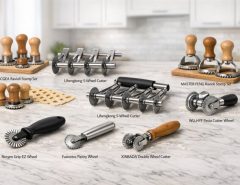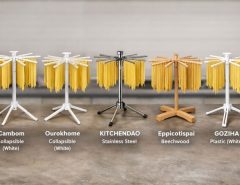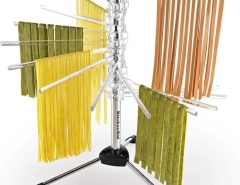Imagine crafting fresh, homemade pasta—spaghetti, fettuccine, or tagliatelle—only to find your noodles sticking together because they didn’t dry properly. A high-quality pasta drying rack can make all the difference, transforming your kitchen into a haven for pasta-making enthusiasts. Whether you’re a seasoned chef or just starting with a pasta maker machine, choosing the right pasta hanging rack ensures your noodles dry evenly with optimal air circulation, preserving their texture and flavor. In this comprehensive guide, we review five top-rated pasta drying racks, exploring their features, pros, cons, and unique qualities to help you find the perfect fit for your kitchen.
This article dives deep into the world of pasta drying racks, covering everything from foldable designs to natural materials like beechwood and stainless steel. We’ve analyzed popular models from Cambom, Ourokhome, KITCHENDAO, Eppicotispai, and GOZIHA, incorporating insights from Serious Eats and other trusted sources. Expect a detailed breakdown, pros and cons, and answers to common questions to guide your purchase. Let’s explore the best pasta hanging racks to elevate your pasta-making experience.
Why You Need a Pasta Drying Rack
Fresh pasta is a labor of love, but without proper drying, your efforts can result in clumpy, sticky noodles. A pasta drying rack, also known as a spaghetti dryer or noodle stand, provides a dedicated space for air circulation, ensuring your pasta dries uniformly without sticking. These racks come in various designs—collapsible, wooden, or stainless steel—each catering to different needs, from compact storage to large-batch drying. Whether you’re using a pasta maker or rolling dough by hand, a drying rack is an essential kitchen tool for achieving restaurant-quality results.
Key benefits include:
- Prevents sticking: Hanging bars or rods keep noodles separated.
- Space-saving: Foldable designs like the Cambom or Ourokhome racks fit small kitchens.
- Versatility: Suitable for spaghetti, linguine, gnocchi, or even ravioli with some models.
- Ease of use: Quick setup and disassembly streamline the pasta-making process.
Let’s dive into our top picks to see how they stack up.

Top 5 Pasta Hanging Racks: Detailed Reviews
1. Cambom Foldable Pasta Drying Rack
The Cambom Foldable Pasta Drying Rack is a compact, budget-friendly option designed for casual pasta makers. Made from food-grade BPA-free plastic, this rack features 10 bar handles and anti-slip feet for stability. Its foldable design makes it ideal for small kitchens, collapsing into a slim profile for easy storage.
Pros:
- Portability: Folds inward for compact storage and travel-friendly use.
- Stable base: Four sturdy feet prevent tipping, even with substantial pasta loads.
- Easy to clean: Smooth plastic surface wipes down effortlessly.
- Affordable: A cost-effective choice for beginners.
Cons:
- Plastic durability: Less robust than wooden or stainless steel alternatives, potentially cracking over time.
- Crowded arms: Limited space between arms may cause noodles to touch when drying large batches.
This rack excels for those with limited space or occasional pasta-making needs. Its lightweight design and quick setup make it a practical choice, though serious pasta makers may prefer a sturdier material.
2. Ourokhome Collapsible Pasta Drying Rack
Rated as the best overall by Serious Eats, the Ourokhome Collapsible Pasta Drying Rack combines affordability with functionality. With 10 hanging arms and a sturdy plastic build, it supports up to 4 lbs of fresh pasta. Its suction cup feet enhance stability, and the collapsible design ensures easy storage.
Pros:
- High capacity: 10 arms accommodate large batches of spaghetti or fettuccine.
- Stable design: Suction cup feet grip wet counters securely.
- Quick setup: Assembles in seconds, ideal for busy kitchens.
- Space-saving: Collapses to 7.8 x 3.5 inches for storage.
Cons:
- Plastic quality: Some users report arms failing to lock after repeated use.
- Limited arm spacing: Close arm placement may crowd noodles.
The Ourokhome rack is a top choice for its balance of price, capacity, and ease of use. It’s perfect for regular pasta makers who want a reliable, no-frills solution.
3. KITCHENDAO Collapsible Pasta Drying Rack
The KITCHENDAO Collapsible Pasta Drying Rack stands out with its stainless steel base and rotary system. Its eight BPA-free plastic arms rotate for easy pasta placement, and it holds up to 6 lbs of noodles. The detachable design simplifies cleaning, making it a favorite for those prioritizing hygiene.
Pros:
- Rotary arms: Spinning arms streamline pasta draping.
- High capacity: Supports up to 6 lbs, ideal for large families.
- Easy to clean: Detachable parts are dishwasher-safe.
- Sturdy base: Stainless steel
Cons:
- Slight wobble: Three rubber-tipped feet may not prevent all movement.
- Smaller capacity: Eight arms hold less than 10-arm models.
This rack is a great blend of innovation and durability, perfect for those who value ease of use and cleaning. Its stainless steel construction adds a premium feel, though it’s slightly less stable than four-footed models.
4. Eppicotispai Natural Beechwood Collapsible Pasta Drying Rack
Crafted from natural beechwood, the Eppicotispai Pasta Drying Rack is a stylish and versatile option for serious pasta makers. Its unique tiered or rod-based design offers 10 square feet of drying space, suitable for long and short pasta, herbs, or even vegetables. Made in Italy, it’s both functional and aesthetically pleasing.
Pros:
- Versatile design: Ideal for various pasta types, including gnocchi and ravioli.
- Aesthetic appeal: Beechwood’s rustic look enhances kitchen decor.
- Large drying space: Accommodates substantial batches.
- Collapsible: Folds flat for easy storage.
Cons:
- Assembly required: Takes longer to set up than plastic models.
- Care needed: Unfinished wood requires gentle cleaning to avoid damage.
The Eppicotispai is perfect for those who prioritize natural materials and versatility. Its larger footprint suits dedicated pasta enthusiasts, though it’s less portable than plastic options.
5. GOZIHA Collapsible Pasta Drying Rack
The GOZIHA Pasta Drying Rack is another plastic option with 10 bar handles and a foldable design. It’s designed for quick setup and easy storage, making it a practical choice for home use. Its lightweight construction and simple design cater to beginners and small kitchens.
Pros:
- Quick setup: Ready to use in moments.
- Compact storage: Collapses easily for small spaces.
- Affordable: Budget-friendly for new pasta makers.
- Stable: Four legs provide decent balance.
Cons:
- Flimsy build: Less durable than stainless steel or beechwood racks.
- Limited capacity: Best for smaller pasta batches.
The GOZIHA rack is a solid entry-level choice, but its flimsier construction may not suit heavy-duty use. It’s ideal for occasional pasta makers looking for simplicity.
How to Choose the Right Pasta Drying Rack
Selecting the best pasta hanging rack depends on your pasta-making habits, kitchen space, and preferences. Here are key factors to consider:
- Material: Choose between food-safe plastic (Cambom, Ourokhome, GOZIHA), stainless steel (KITCHENDAO), or natural beechwood (Eppicotispai). Plastic is lightweight and affordable, stainless steel is durable and easy to clean, and wood offers a rustic, eco-friendly appeal.
- Capacity: Consider how much pasta you make. Larger racks like Ourokhome (4 lbs) or KITCHENDAO (6 lbs) suit big batches, while GOZIHA is better for smaller ones.
- Storage: Foldable designs (all reviewed models) save space, with collapsed dimensions as small as 7.8 x 3.5 inches (Ourokhome).
- Stability: Look for anti-slip feet or suction cups (Ourokhome) to prevent tipping. Four-legged designs (Cambom, GOZIHA) are generally more stable than three-legged ones (KITCHENDAO).
- Ease of Use: Features like rotary arms (KITCHENDAO) or transfer wands (some bamboo models) simplify pasta placement.
- Cleaning: Detachable (KITCHENDAO) or wipe-down (Ourokhome, Cambom) racks are easiest to maintain. Unfinished wood (Eppicotispai) requires careful cleaning.
- Design: Consider aesthetics—beechwood racks add a traditional touch, while stainless steel or plastic models look modern.
For those taking a pasta-making class or using a pasta extruder, a versatile rack like the Eppicotispai can handle diverse pasta shapes. If you prioritize room-temperature storage, collapsible racks are ideal for tucking away in cabinets.
Pros and Cons of Pasta Drying Racks
Pros
- Even drying: Ensures air circulation for non-sticky pasta.
- Space efficiency: Collapsible designs fit small kitchens.
- Versatility: Suitable for various pasta types and even other foods (Eppicotispai).
- Ease of use: Quick setup and intuitive designs streamline drying.
- Affordability: Options like Cambom and GOZIHA are budget-friendly.
Cons
- Durability concerns: Plastic models (Cambom, GOZIHA) may wear out faster.
- Space limitations: Crowded arms can cause noodles to touch (Ourokhome, Cambom).
- Assembly time: Wooden racks (Eppicotispai) may require more setup effort.
- Stability issues: Some models (KITCHENDAO) may wobble under heavy loads.
- Cleaning challenges: Unfinished wood racks need careful maintenance.
Tips for Using Your Pasta Drying Rack
- Ensure proper spacing: Drape noodles carefully to avoid touching, maximizing air circulation.
- Clean regularly: Wipe plastic or stainless steel racks with a damp cloth; gently wash unfinished wood to prevent damage.
- Balance the load: Distribute pasta evenly to prevent tipping, especially with three-legged racks.
- Use a transfer wand: Some racks (like bamboo models) include a wand to simplify pasta placement.
- Store properly: Collapse and store in a dry place to maintain rack condition.
For those without a rack, a Reddit user suggested wrapping clothes hangers in plastic wrap as a DIY solution, but a dedicated rack offers better results and convenience.
Explore with us:
- Imperia Classic Line Ravioli Maker – Authentic Italian Steel Accessory: Craft Perfect Pasta at Home
- Imperia Mille Gnocchi Cutter – Authentic Italian Quality And Easy Homemade Pasta
- Imperia Pasta Machine with Motor: Your Gateway to Authentic Italian Noodles
Enhance Your Pasta-Making Experience
Pair your drying rack with other tools like a dough scraper, ravioli maker cutter, or pasta maker accessory (e.g., KitchenAid KPDR) for a seamless process. A drying mat or polyester dish mat can complement your rack by providing a surface for resting pasta before hanging. If you’re exploring pasta-making classes, a reliable rack like the Ourokhome or Eppicotispai will enhance your practice. For large batches, ensure your rack has enough drying space and hanging bars to avoid overcrowding.
Conclusion
A pasta drying rack is a must-have for homemade pasta enthusiasts, ensuring your noodles dry perfectly every time. The Ourokhome Collapsible Pasta Drying Rack stands out for its balance of affordability, capacity, and stability, while the Eppicotispai offers versatility for diverse pasta types. For small kitchens, the Cambom or GOZIHA racks provide compact solutions, and the KITCHENDAO’s rotary system adds a touch of innovation. Consider your pasta-making frequency, kitchen space, and material preferences when choosing.
Ready to elevate your pasta game? Browse our top picks on Amazon and start crafting restaurant-quality noodles at home. Share your favorite pasta recipes or drying rack experiences in the comments below, and subscribe for more kitchen tips and reviews!
FAQs
What is the best material for a pasta drying rack?
It depends on your needs. Plastic (Cambom, Ourokhome) is affordable and lightweight, stainless steel (KITCHENDAO) is durable and easy to clean, and natural beechwood (Eppicotispai) offers a rustic look but requires gentle care.
Can I dry short pasta like gnocchi on these racks?
Yes, the Eppicotispai’s tiered design is ideal for short pasta like gnocchi or ravioli. Traditional hanging racks are better suited for long noodles like spaghetti.
How much pasta can these racks hold?
Capacities vary: Ourokhome holds up to 4 lbs, KITCHENDAO up to 6 lbs, and Eppicotispai offers 10 square feet of drying space. Cambom and GOZIHA are better for smaller batches.
Are collapsible pasta racks stable?
Most collapsible racks (Cambom, Ourokhome, GOZIHA) have anti-slip feet or suction cups for stability. Four-legged designs are generally more stable than three-legged ones like KITCHENDAO.
How do I store a pasta drying rack?
All reviewed racks are foldable for easy storage. Plastic models collapse into compact cylinders, while wooden racks like Eppicotispai fold flat, saving counter space.










Leave a Reply